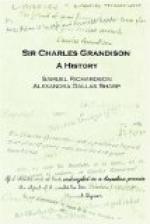She professed to like the people here, and the face of the country; and talked favourably of the religion of it: but, poor woman! she likes all those the better, I doubt not, for the sake of one Englishman. Love, Lucy, gilds every object which bears a relation to the person beloved.
Lady Maffei was very free in blaming her niece for this excursion. She took her chiding patiently; but yet, like a person that thought it too much in her power to gratify the person blaming her, to pay much regard to what she said.
I took a chair to Lady G——’s. Emily ran to meet me in the hall. She threw her arms about me: I rejoice you are come, said she. Did you not meet the house in the square?—What means my Emily?—Why, it has been flung out of the windows, as the saying is. Ah madam! we are all to pieces. One so careless, the other so passionate!—But, hush! Here comes Lady G——.
Take, Lucy, in the dialogue-way, particulars.
Lady G. Then you are come, at last, Harriet. You wrote, that you would not come near me.
Har. I did; but I could not stay away. Ah, Lady G——, you will destroy your own happiness!
Lady G. So you wrote. Not one word, on the subject you hint at, that you have ever said or written before. I hate repetitions, child.
Har. Then I must be silent upon it.
Lady G. Not of necessity. You can say new things upon old subjects.— But hush! Here comes the man.—She ran to her harpsichord—Is this it, Harriet? and touched the keys—repeating
“Softly
sweet, in Lydian measures,
Soon she sooth’d——
——”
ENTER LORD G.
Lord G. Miss Byron, I am your most obedient servant. The sight of you rejoices my soul.—Madam (to his lady), you have not been long enough together to begin a tune. I know what this is for—
Lady G. Harmony! harmony! is a charming thing! But I, poor I! know not any but what this simple instrument affords me.
Lord G. [Lifting up his hands.] Harmony, madam! God is my witness— But I will lay every thing before Miss Byron.
Lady G. You need not, my lord: she knows as much as she can know, already; except the fine colourings be added to the woeful tale, that your unbridled spirit can give it.—Have you my long letter about you, Harriet?
Lord G. And could you, madam, have the heart to write—
Lady G. Why, my lord, do you mince the matter? For heart, say courage. You may speak as plain in Miss Byron’s presence, as you did before she came: I know what you mean.
Lord G. Let it be courage, then.
Har. Fie, fie, Lord G——! Fie, fie, Lady G——! What lengths do you run! If I understand the matter right, you have both, like children, been at play, till you have fallen out.




